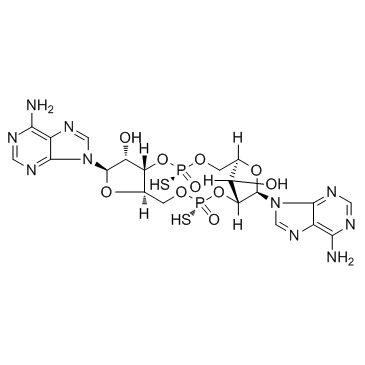| References: |
ML-RR-S2 CDA is a potent STING-activating cyclic di-adenosine (CDA or c-diAMP) nucleotide ligand with the 2′-5′, 3′-5′ mixed phosphodiester linkage (ML) in the [Rp,Rp] configuration and doubly substituted thiophosphate (S2) for optimal phosphodiesterase-resistance and thereby enhanced cellular potency. ML-RR-S2 CDA effectively induces IRF3, NF-kB, and STAT6 transcription activities in a STING-dependent manner in both murine (DC2.4 & BMMs) and human (THP1 & PBMCs) cultures (5-100 μM) as well as displays profound anti-tumor efficacy in vivo (100% growth inhibition of established B16.F10, 4T-1 or CT26 tumor with 3X 50 μg/mouse/96 hr intratumoral injections) with lasting immune-mediated tumor rejection.It contains mixed linkages (ML) with both 2'5' and 3'5' linkages, which leads to increased thermal stability of human STING in a differential scanning fluorimetry (DSF) assay. ML RR-S2 CDA increases type I interferon production by THP-1 human monocytes relative to unmodified cyclic di-AMP, indicating the ML enhances its action at human STING. It induces expression of IFN-β and the pro-inflammatory cytokines TNF-α, IL-6, and Mcp-1 in murine bone marrow macrophages (BMM) isolated from wild-type, but not STING-/-, mice. ML RR-S2 CDA also induces IFN-β expression in peripheral blood mononuclear cells (PBMCs) isolated from donors carrying STINGWT/WT, STINGWT/REF, and STINGWT/HAQ alleles. In vivo, ML RR-S2 CDA initiates tumor regression and prevents tumor growth upon tumor cell reimplantation in 4T1 breast and CT26 colon cancer mouse xenograft models. |























